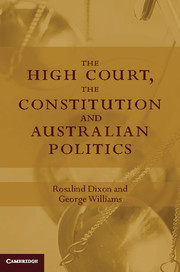Description
The High Court, the Constitution and Australian Politics
Coordinators: Dixon Rosalind, Williams George
Language: English
Subject for The High Court, the Constitution and Australian Politics:
Publication date: 02-2015
Support: Print on demand
Support: Print on demand
Description
/li>Contents
/li>Biography
/li>
The High Court, the Constitution and Australian Politics is an in-depth exploration of the relationship between decisions of the High Court and broader political currents in Australia. It begins with an investigation of the patterns and effects of constitutional invalidation and dissent on the High Court over time, and their correlation with political trends and attitudes. It also examines the role of constitutional amendment in expressing popular constitutional understandings in the Australian system. Subsequent chapters focus on the eras marked by the tenure of the Court's 12 Chief Justices, examining Court's decisions in the context of the prevailing political conditions and understandings of each. Together, the chapters canvass a rich variety of accounts of the relationship between constitutional law and politics in Australia, and of how this relationship is affected by factors such as the process of appointment for High Court judges and the Court's explicit willingness to consider political and community values.
1. Judicial review, invalidation and electoral politics: a quantitative survey Russell Smyth and Vinod Mishra; 2. Judicial review and the politics of constitutional amendment Michael Coper; 3. Judicial dissent and the politics of the High Court Andrew Lynch; 4. The Griffith Court John M. Williams; 5. The Knox Court Anne Twomey; 6. The Isaacs Court Tony Blackshield; 7. The Duffy Court Gabrielle Appleby; 8. The Latham Court: law, war and politics Fiona Wheeler; 9. The Dixon Court Helen Irving; 10. The Barwick Court Brian Galligan; 11. The Gibbs Court Nicholas Aroney and Haig Patapan; 12. The Mason Court Paul Kildea and George Williams; 13. The Brennan Court Patrick Emerton and Jeffrey Goldsworthy; 14. The Gleeson Court and the Howard era: a tale of two conservatives (and isms) Rosalind Dixon and Sean Lau; 15. The French Court Anika Gauja and Katharine Gelber.
Rosalind Dixon is a Professor of Law, at the University of New South Wales, Faculty of Law, having recently served as an Assistant Professor at the University of Chicago Law School. She earned her BA and LLB from the University of New South Wales, and was an associate to the Chief Justice of Australia, the Hon. Murray Gleeson AC, before attending Harvard Law School, where she obtained an LLM and SJD. Her work focuses on comparative constitutional law and constitutional design, theories of constitutional dialogue and amendment, socio-economic rights and constitutional law and gender, and has been published in leading journals in Canada, the US, the UK and Australia, including Osgoode Hall Law Journal, Cornell Law Review, the University of Pennsylvania Journal of Constitutional Law, The International Journal of Constitutional Law and the Sydney Law Review.
George Williams AO is one of Australia's leading constitutional lawyers and public commentators. He is the Anthony Mason Professor, a Scientia Professor and the Foundation Director of the Gilbert and Tobin Centre of Public Law at the Faculty of Law, University of New South Wales. As an Australian Research Council Laureate Fellow, he is engaged in a five year international project on anti-terror laws and democracy. He has held visiting positions at Osgoode Hall Law School in Toronto, Columbia University Law School in New York and University College London. George has written and edited 28 books. He has appeared as a barrister in the High Court in some of the most important constitutional law cases of the last two decades, such as Lange v. Australian Broadcasting Corporation, the Hindmarsh Island Bridge Case and Plaintiff S157/2002 v. Commonwealth. He has also appeared in the Supreme Court and Court of Appeal of Fiji, including in Republic of Fiji v. Prasad on the legality of the 2000 coup. He has served on a number of public inquiries. As chair of the Victorian Human Rights Consultation Committee in 2005 he helpe
George Williams AO is one of Australia's leading constitutional lawyers and public commentators. He is the Anthony Mason Professor, a Scientia Professor and the Foundation Director of the Gilbert and Tobin Centre of Public Law at the Faculty of Law, University of New South Wales. As an Australian Research Council Laureate Fellow, he is engaged in a five year international project on anti-terror laws and democracy. He has held visiting positions at Osgoode Hall Law School in Toronto, Columbia University Law School in New York and University College London. George has written and edited 28 books. He has appeared as a barrister in the High Court in some of the most important constitutional law cases of the last two decades, such as Lange v. Australian Broadcasting Corporation, the Hindmarsh Island Bridge Case and Plaintiff S157/2002 v. Commonwealth. He has also appeared in the Supreme Court and Court of Appeal of Fiji, including in Republic of Fiji v. Prasad on the legality of the 2000 coup. He has served on a number of public inquiries. As chair of the Victorian Human Rights Consultation Committee in 2005 he helpe
© 2024 LAVOISIER S.A.S.




